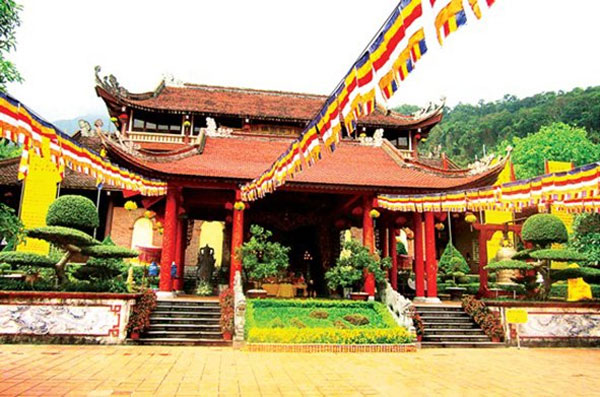Finding inner peace at Yen Tu
 |
| Bi Thuong Pagoda at the foot of Yen Tu Mountain – Photo: Nguyen The Luong |
For Vietnamese people, when speaking of Yen Tu Mountain and Yen Tu Buddhism Complex on that mountain, it would not be complete if they make no mention of King Tran Nhan Tong, who ruled the country from 1279 to 1293 and twice led the nation to defeat the Mongol invaders before abdicating the throne and passing the crown to his son to embrace the life of a Buddhist monk at a pagoda on the mountain. The King founded the Truc Lam zen sect, so Yen Tu became the cradle of Buddhism in the nation.
To start a journey to the 1,068-meter-high Yen Tu Mountain, visitors should stop at Uong Bi City. From its foot, the mountain looks imposingly high. There are two ways to reach the mountain peak. First, pilgrims can walk thousands of stone steps on the mountain side through the forest filled up with flowers of different colors and aromas. This way, they can see the thick green foliage of the forest, and hear birdsongs mixed with the sound of streams and pagoda bells.
Second, they can climb the stone steps for a while before taking a cable car ride above the primitive forest and then landing at a spot on the mountain side to continue walking to the top.
On the way up, they will see many pagodas such as Mot Mai, Hoa Yen, Giao Oan and Suoi Tam. Especially, on the top of the mountain is Vietnam’s largest bronze statue of King Tran Nhan Tong.
Near the mountain peak, it is much cooler and foggier. The top of the mountain is home to Dong (Bronze) Pagoda built from bronze and known as the place where King Tran Nhan Tong had come for zen.
After visiting the pagoda and finishing a sightseeing tour, tourists can stop by stalls on the way down or at the foot of the mountain where local people sell specialties of the upland such as bamboo sprout, fruit and medicinal plants.
What the stars mean:
★ Poor ★ ★ Promising ★★★ Good ★★★★ Very good ★★★★★ Exceptional
Latest News
More News
- Manila becomes a new check-in destination for Vietnamese youth (December 11, 2025 | 18:07)
- Vietjet launches mega year-end ticket promotion (December 10, 2025 | 11:33)
- Dalat leads Vietnam’s 2025 search trends (December 09, 2025 | 13:44)
- Vietnam welcomes record wave of international visitors (December 09, 2025 | 13:43)
- Vietjet launches daily Manila flights to celebrate year-end festive peak season (December 05, 2025 | 13:47)
- The destinations powering Vietnam’s festive season travel demand (December 04, 2025 | 18:33)
- Vietnam named among the world’s most exciting winter destinations (December 04, 2025 | 15:10)
- Phu Tho emerges as northern Vietnam’s new tourism hub (December 01, 2025 | 17:00)
- Vietjet completes Airbus A320/A321 updates ahead of deadline (December 01, 2025 | 09:49)
- Vietjet resumes Con Dao flights from early December (November 28, 2025 | 15:24)
















 Mobile Version
Mobile Version